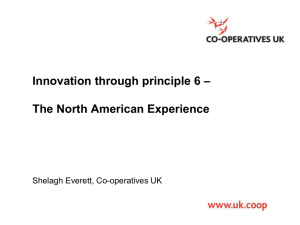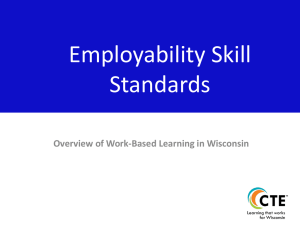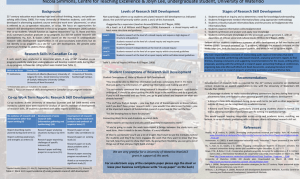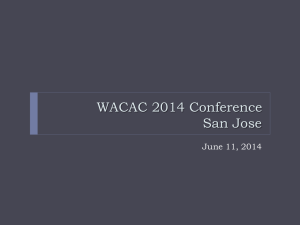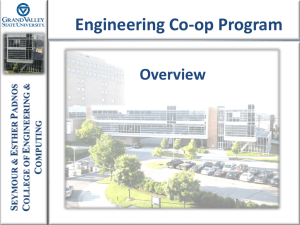CoopZone Development Training Program Powerpoint Information
advertisement
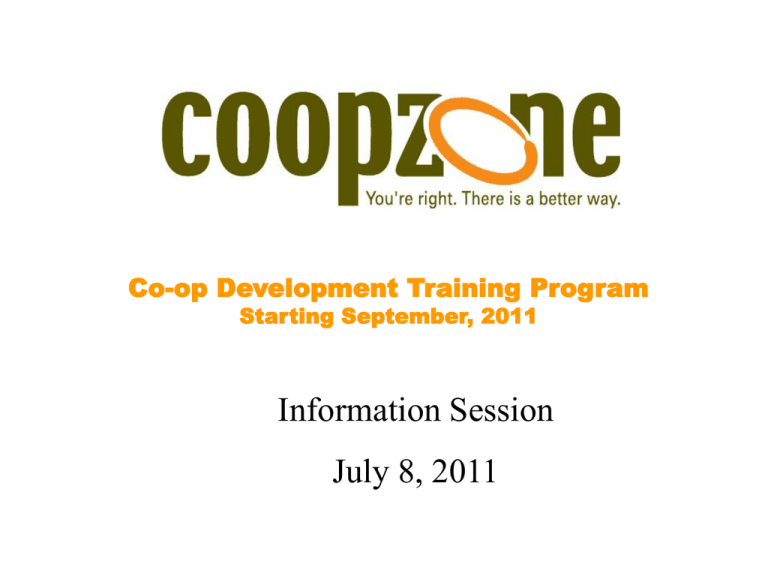
Co-op Development Training Program Starting September, 2011 Information Session July 8, 2011 Agenda • • • • • • • • Introductions Foundations Course Advanced Course I Advanced Course II Learning Strategy Mentoring Tuition and Bursaries Questions Foundations Course Part I - Section 1 Introduction to the Co-operative Movement and Co-op Development • Module 1.1 History and Benefits • Module 1.2 Structure of the Co-op Movement • Module 1.3 Co-op Development Foundations Course Part I - Section 2 Co-operative Basics • Module 2.1 Co-op Identity and Principles • Module 2.2 Co-op Structure • Module 2.3 Legal Framework – Acts, Regulations, Articles, Bylaws, and Policies Foundations Course Part I - Section 3 Personal Behaviour, Networks and Skills • Module 3.1 Professional Behaviour Ethic • Module 3.2 Networks and Resources • Module 3.3 Information Technology (IT) Foundations Course Part II - Section 4 • • • • • Facilitation, Leadership, Team Building and Training Module 4.1 Communication Skills Module 4.2 Facilitations Skills Module 4.3 Negotiation, Conflict Resolution Module 4.4 Adult Education and Training Module 4.5 Financial, Social, and Environmental Accounting Knowledge Foundations Course Part II - Section 5 • • • • • Co-op Enterprise Assessment, Planning and Implementation Module 5.1 Co-op Feasibility Evaluation Module 5.2 Co-op Enterprise Planning Module 5.3 Project Management Module 5.4 Co-op Financing Module 5.5 Diagnostic and Problem-Solving Foundations Course Outcomes The participant will have an understanding of: • The benefits, basic characteristics and types of cooperatives that address people’s needs & aspirations; • The co-op development process and the roles of the potential members and development facilitators; • The professional and ethical responsibilities of cooperative development facilitators; • The basic facilitation skills required to assist a group to engage in creating a co-operative; and • The skills required to complete an early stage assessment of the potential for success of a new co-operative, including a basic financial analysis and breakeven. Advanced Course 1 Section 1 The Co-operative Movement: Benefits, Values and Structure • Module 1.1 History and Benefits • Module 1.2 Structure of the Co-op Movement • Module 1.3 Co-op Identity and Principles Advanced Course 1 Section 2 The Co-operative as an Adaptable Enterprise • Module 2.1 The Co-operative Structure • Module 2.2 Adapting Co-op Development • Module 2.3 Bylaws, Regulation & Governance Advanced Course 1 Section 3 • • • • Individual Behaviour & Skills Module 3.1 Professional Behaviour Ethic. Module 3.2 Networks and Resources. Module 3.3 Information Technology. Module 3.4 Diagnostic & ProblemSolving. Advanced Course 1 Outcomes The participant will be able to: • Communicate the importance of community economics & social capital & the effectiveness of co-ops within local & global contexts. • Articulate the roles of the national apex co-operative organizations, & their relationship with the regions & be aware of co-op sector sources for financial support. • Explain the Statement of Co-op Identity, Values and Principles and how they are manifested in different forms of co-operatives. Advanced Course 1 Outcomes The participant will able to: • Adapt the co-op structure and development process to different types of co-operatives & circumstances. • Be cognizant of key ethical and professional standards. • Access and share key co-op development resources and information. • Determine & use appropriate communication tools. • Facilitate problem-solving sessions. Advanced Course 2 Section 4 Communication, Facilitation, Training & Team Building • Module 4.1 Communication Skills • Module 4.2 Facilitation Skills • Module 4.3 Negotiation, Conflict Resolution & Brokering • Module 4.5 Adult Education and Training • Module 4.5 Financial, Social, & Environmental Accounting Knowledge Advanced Course 2 Section 5 Co-op Enterprise Assessment, Planning and Implementation • Module 5.1 Co-op Feasibility Evaluation • Module 5.2 Co-op Enterprise Planning • Module 5.3 Project Management • Module 5.4 Co-op Financing Advanced Course 2 Outcomes The participant will be able to: • Communicate complex and subtle concepts in a cogent and clear manner in plain language. • Facilitate the development of effective teams. • Facilitate meetings that encourage full participation, promote mutual understanding, foster inclusive solutions and teach new thinking skills. • Explain the different types of decision-making options & facilitate a group’s discussion on what approach to use. • Explain and use the process of using controversy as a source of generating creative solutions that work to build consensus around desired outcomes. Advanced Course 2 Outcomes The participant will able to: • Explain the ongoing role of learning for co-op members in the co-op development process. • To organize, facilitate, guide and coach learning as a means to accomplish co-op development milestones. • Assist in implementing a basic financial, environment & social accounting system and explain their importance for transparent governance and effective management. • Complete a feasibility study and business plan. • Develop a financing plan & facilitate its implementation. • Develop and implement project management processes for different types of co-operatives. Learning Strategy This training programs seeks to engage, inform, and challenge you through: • Self-directed study using online learning modules • Online discussion forums • Webinars • Teleconference discussion forums • Individual and Team Assignments • Personal mentoring Mentoring • Personal mentoring is a key aspect of the programs. • Each participant will be assigned a mentor. • Mentoring sessions will occur at least once a month or more frequently as agreed upon by the mentor and mentee. • The mentoring session will be guided by the template and brief reports filed by the mentor with the course director. Bursaries • Bursaries for up to 50% of the course will be available through an application process. • The criteria will be based upon financial need and an assessment of the participant’s commitment to activity engaging in the provision of co-op development services. • The number and amount of the bursaries will depend upon the current CZ fund-raising campaign and the number of students that register. • Bursaries will be confirmed by the last week of August. Questions?



